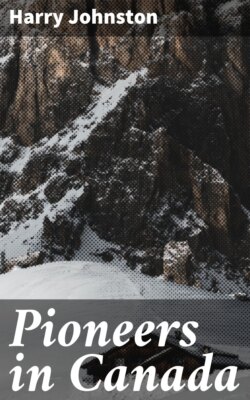Читать книгу Pioneers in Canada - Harry Johnston - Страница 13
На сайте Литреса книга снята с продажи.
ICEBERGS AND POLAR BEARS
ОглавлениеHENRY HUDSON, the great English navigator, who had made two voyages (1607–8) for the English-Moscovy Company to discover a north-east passage to India, past Siberia, commanded a third experiment in 1609 at the expense of the Dutch East India Company. He was to discover the North-West Passage. For this purpose he entered the river now named the Hudson, but soon found it was only a river; though he returned to Holland with such an encouraging account of the surrounding country that the Dutch a little later on, founded on the banks of the Hudson River their colony of New Amsterdam (afterwards the State of New York). In 1610 Hudson accepted a British commission to sail beyond where Davis and Frobisher had passed, and once more seek for the north-west passage to China. Instead he found the way into Hudson's Bay. Here his men, alarmed at the idea of being lost in these regions of ice and snow, mutinied against him, placed him and those who were faithful to him in a boat, and cast them off, themselves returning to England with the news of his discovery. Hudson was never heard of again, and, strange to say, the mutineers apparently received no punishment.
Between 1602 and 1668, English adventurers from London and Bristol, notable amongst whom were WILLIAM BAFFIN, LUKE FOX, and CAPTAIN JAMES, mapped the coasts of Hudson's Bay and Baffin's Bay and brought to the notice of merchants in England the abundance of whales in these Arctic waters, and of fur-bearing beasts and fur-trading Indians in the region of Hudson's Bay.
This last point was most forcibly presented to Charles II and his Government by a disappointed French Canadian, Pierre Esprit Radisson, whose adventures will later on be described. Radisson, conceiving himself to be badly treated by the French Governor of Canada, crossed over to England with his brother-in-law, Chouart, and the two were warmly taken up by Prince Rupert of Bavaria, the cousin of Charles II. They were sent out by Prince Rupert in command of an expedition financed by him and a number of London merchants, and in 1669 the New England captain, Gillam, returned to England with Chouart and the first cargo of furs from Hudson's Bay. This cargo so completely met the expectations of those who had promoted the venture that it led in 1670 to the foundation of the Governor and Company of Adventurers of England trading into Hudson's Bay, a company chartered by Charles II and presided over by Prince Rupert, and an association which proved to be the germ of British North America, of the vast three-quarters of the present Dominion of Canada.
1 The name was also spelt Furbusher, and in other ways. He became Sir Martin Frobisher over the wars of the Armada, and died Lord High Admiral of England in 1592.
2 It may be of interest to set forth the kind of rations shipped in those Elizabethan times for the food of the sailors. According to Frobisher's accounts these consisted of salted beef, salt pork, salt fish, biscuit, meal for making bread, dried peas, oatmeal, rice, cheese, butter, beer, and wine, with brandy for emergencies. As regards beer, the men were to have a ration of 1 gallon a day each. Altogether it may be said that these rations were superior in variety—and no doubt in quality—to the food given to seamen in the British merchant marine in the nineteenth century.
3 We now know Meta Incognita to be the southernmost peninsula of the vast Baffin Island.
4 In 1584, Sir Walter Raleigh, the half-brother of Sir Humphrey Gilbert, financed an expedition to sail to the coast of North America in a more southerly direction. In this way was founded the (afterwards abandoned) colony of Roanoke, in North Carolina. It was to this region that Queen Elizabeth applied the title of Virginia, which some years afterwards was transferred to the first English colony on the James River.
[TABLE OF CONTENTS]
